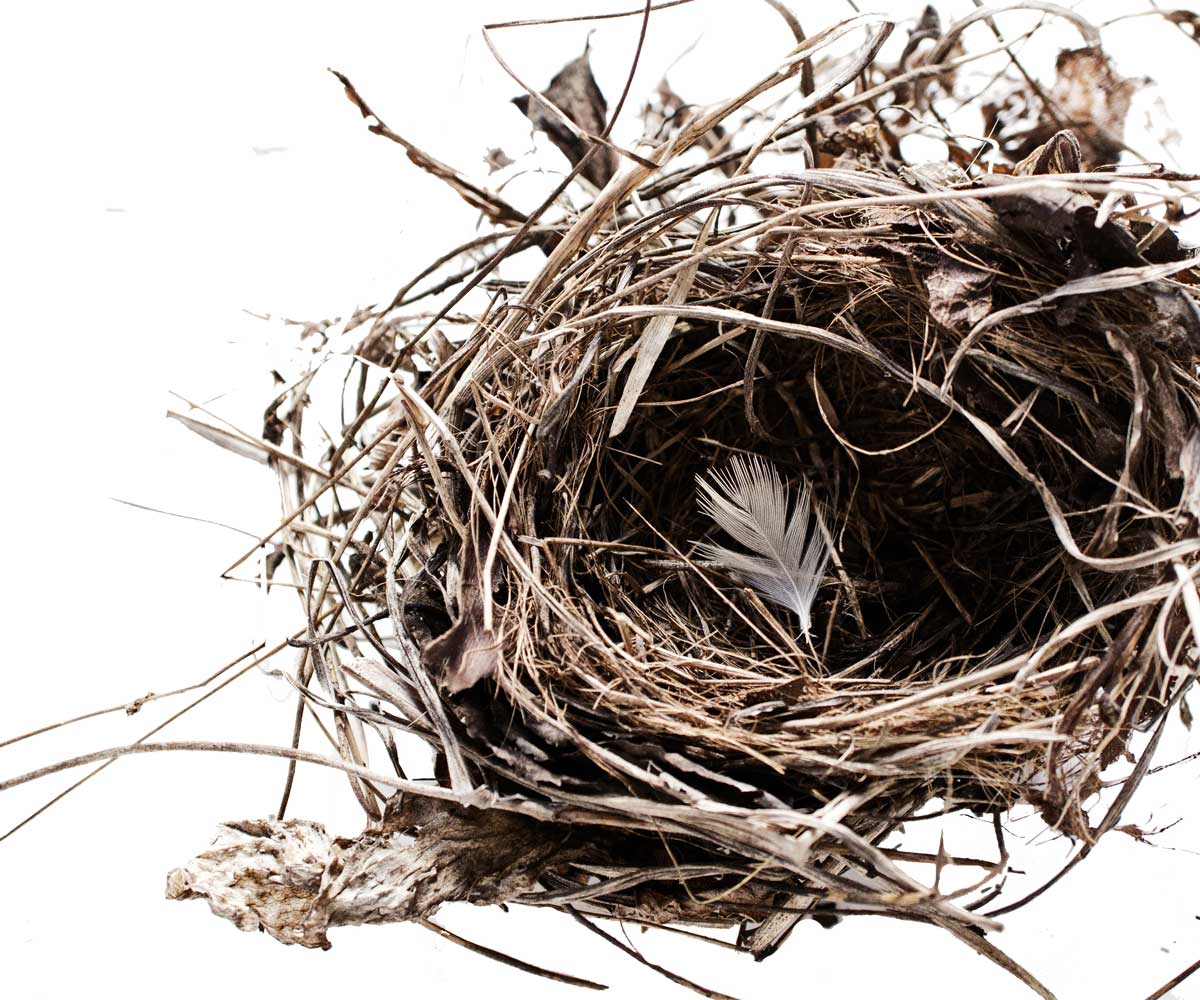Empty nest. Such a deceptively simple phrase. All it ever conjured for me was dried twigs, a few gnarly feathers and a couple of fat, smug sparrows. It’s not until you become an Empty Nester yourself, that the full messy complexity of the concept hits home.
Just after my first child was born, I’d take her to Hyde Park in London, where we lived at the time. It was a beautiful summer, and I’d spread a blanket under the trees where she would gaze at the sky and I would stare at her. I was smitten, and wondered at the courage of people whose kids had all grown up. How were those parents doing it, just walking around like that, not being paralysed with grief?
Later, with two small daughters and by now in New Zealand, my feelings were murkier. Sure, I loved them as much, if not more. But thousands of miles from family, often exhausted and lonely, it was hard work. At times, Empty Nest seemed like a never-to-be-fulfilled promise.
Changing times
Once we’d settled and my daughters grew, that changed. Their energy and sense of fun was beautiful – even, perhaps especially, in their adolescence.
When we weren’t yelling at each other, we’d be laughing like lunatics, or sprawled on the bed reading together, or just watching a movie. In those quiet moments, everyone safe in the nest, it felt like everything was right with the world.
Then my elder daughter left at 18, to study in Wellington. Yes, I was tearful. But it’s only a short flight away, and she was super-excited about her course, so I couldn’t help but be happy too.
Also I had my younger daughter at home. Then before you could say ‘heart like a nest with the wind howling through it’, she too, at 19, had flown.
Yep, just like that she walked towards a plane bound for South America and was gone.
I didn’t cry much. I mean, I did… the week before she left, behind sunglasses. At the airport, sure, I sniffled a little but was proud of how collected I was.
Magic moments
But then it was like a sadistic video editor had taken up residence in my head, and was gleefully compiling ‘Edited Highlights Of The Past 20 Years’.
I’d see a mum with young kids and there it was: an image of my daughters aged two, outstretched arms for me to pick them up. Out-takes of me and my daughters played in my mind. Like the time the three of us rented a bach in Hahei, and there was a storm that freaked us out so we all bundled into one small bed and it was like a hilarious game of Twister, trying to arrange our limbs for sleep. Stuff like that. Just the simple fabric of closeness.
Don’t get me wrong. I knew it was good for them to leave. And it wasn’t like they’d gone flatting on Mars, or joined a cult.
But still… There was no textbook for this, as far as I could see. How was I supposed to be acting? Should I simply pop those memories into a folder named ‘They’ve-Gone-Goodbye-Get-Over-It’ and lock it away? How would I feel in two months’, a year’s time? Did they still need me? How could I let them go and keep them close?
Well I can answer a few of those questions now: though it’s only been six weeks or so since my youngest left. The nest is still strewn with ‘feathers’ – orphaned socks, a dog-eared copy of Daughter of Smoke and Bone. It’s like a scattered still-life representing my daughters’ stages of evolution.
But anyway, here’s what I’ve learned so far…

Don’t expect everyone to ‘get it’
(Or rather, to behave as you’d like) So there I was, one day walking around my daughter’s recently vacated room, fondly picking up what she’d left behind.
The next moment, it seemed, my partner was emptying it of furniture, fitting a kitchen unit and converting it into a room for rent. He did wait a couple of weeks after she’d gone.
Still, I was mildly indignant. I knew we needed extra money, it is his house, she had no emotional attachment to the room (we’d only been here a year and she lived at her dad’s too), so I couldn’t work out why it bothered me.
Once I had figured out what was behind it (see next point), the room makeover made me smile. Here was my partner, electric drill in hand, giving me a very pragmatic lesson in ‘life moves on’. A PowerTool presentation, if you will.
That doesn’t mean he doesn’t care; he’s just different to me. His policy with his four grown-up kids is they can come back whenever, stay for however long they want, and so can mine. Which leads me to….
Give yourself a break
What I realised from the room-for-rent shenanigans is that, in an ideal world, both my daughters would have their old room to return to Forever, just like the character Summer in The OC, complete with My Little Ponies and wafty princess curtains round the bed.
But we’ve shifted rental homes about seven times since I split from their dad, and that’s just our reality.
They’ve never had a Forever room. Yes, I can wade through guilt and ‘what ifs’. Or I can accept that we are each other’s home.
When my children return, I will be here… offering love, support, a full fridge, and clothes to borrow which inevitably I will never see again. That is us. That is our invisible forever house.
Feel what you feel
“In this phase, it’s our job to be okay,” says US-based Amanda Barusch, professor emeritus at the University of Otago, who carried out research into Kiwi empty-nesters.
“When they were younger it was our job to feed them, to keep them safe. Now our role is to model what being an adult is to our kids.”
So while crying is a great coping mechanism, weeping loudly on the end of a phone line to your child, not so much.
“You can’t put that on them; they have enough stuff going on. Remember, they’re adults but they’ll have days when they’re still that three-year-old. They need you to be their support,” says Amanda. So I keep any sadness to a quick ‘I miss you’ on the phone. I think they get it.
When it does feel – momentarily – about you, that’s fine too. The Empty Nest blues may hit you majorly, they may not. You may want to host a ‘Yay, I’m Free’ party; you may want to go for solitary walks and cry.
You may feel both at the same time. “Give yourself permission to feel all the different emotions that may surface when a child leaves home. It takes time to process change and there’s no right or wrong way to feel – we all cope differently,” says Shaun Robinson, CEO of the Mental Health Foundation.
My emotions flood out whether I’ve given myself permission or not, so no problems there. Amanda Barusch says, “Kids leaving home is huge. So yes, cry… the car is a great place for that!” Ah yes, if only Nissans could talk.
However, there is feeling sad, and then there’s a whole other level. Shaun emphasises that if the grief feels overwhelming, you should talk to your doctor or a counsellor. And there are lots of support groups on Facebook where you can chat with people going through the same life changes.
Be kind to yourself
Even if you don’t need a therapist, you must look after your own mental wellbeing. After all, you want to be the rock your kids swim back to, not
a big messy sponge that can’t even support their weight – never mind all their dirty washing.
For me, exercise is crucial when my emotional health feels a bit mushy. With the humid weather we’ve been having, the thought of going for my usual run hasn’t appealed so I’ve downloaded an awesome Pilates/yoga/core-training app, which I follow on a regular basis.
Shopping therapy is a given, and I immerse myself in long chats, wine catch-ups and walks with friends. Last but not least, my feet are available for massage 24/7 (another reason why I forgive him the room-for-rent thing).
I’m also sleeping lots, and heeding the advice of Shaun Robinson: Try to see the new phase as one of opportunity, a time to “re-evaluate what’s important to you, what hobbies or goals you would like to take up, what people you would like to build stronger relationships with.”
So now I’m drawing, reading (though it turns out it wasn’t lack of time that stopped me reading Ulysses; it’s just impenetrable), making yummy food, writing letters…

Write it out
I’ve always loved letter writing. It’s so much more intimate; like you’re actually face to face. Even an email feels one step removed. But it seems silly to write a letter to someone you sit next to watching Netflix every night.
The new-found separation provides the perfect excuse. Conversations on meaningful stuff (especially between mums and daughters) can often be misconstrued and descend into argument, but in a letter you have time – and no interruptions – to truly explain what you feel.
An important point about letter-writing: don’t expect reciprocity, says Amanda. She’d write to her kids, now in their thirties, and get nothing back. But she later discovered they had kept every one of her letters. Her correspondence was important to them; they just never said so.
Sent with love
Sending love in a box is so satisfying – though I learned to up my parcel game when it came to sending stuff to my Wellington daughter.
My first ever one included lingerie, a bottle of rosé, some dangly earrings and organic chocolate. She then got quite sick with flu, and I made a note-to-self that actually some supplements/vitamins might have been more helpful.
Whether it is a care package, a letter, phone call or social media, it’s all about finding new ways to connect with the kids once they’ve left. Love isn’t like a bus ticket; it’s not limited by zones. The world is its oyster.
Plan ahead
This is one survival tactic that was common among empty-nester friends I spoke to. My friend, Alison, misses her daughter now she’s just moved to Australia, but she’s thinking to the future.
“I am looking positively, thinking, ‘Well that’s my New Year’s sorted out’. I’ll be going to Sydney.”
So, yes, I’m formulating a few plans of my own. I have a trip to South America, which is taking shape nicely in my head (if not in my bank account).
All in all, do I miss them any less as time goes by? No. Do I wish they were 10 or 12 again? Sometimes, yes. I have moments when I fantasise about picking them up from school and taking them home to bake or read together (there’s no battling over homework, of course, or arguments about dishes).
But I think the point is to neither block the memories out, or to linger there too long. Dive into nostalgia, for sure. But swim back up to see the now, and all its wonderful possibilities.
After all, you are still linked to the past. It’s all part of a continuum. Your children are still your children, but they’ve evolved. They may need your love, your advice, occasionally your car… but they are learning to be independent now, to carve lives of their own. And surely that is a cause for celebration?

